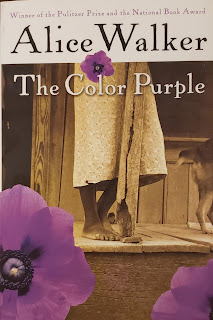JANUARY – New to You Author
Read a book by an author whose writing you’ve never read before.
My choice: The Color Purple, by Alice Walker
TL;DR paragraph at the bottom
TL;DR paragraph at the bottom
Anyway,I was surprised by this book.
I think I expected a more narrative format, but the epistolary format quickly became familiar and easy to read. More than that, however, I was surprised by the sexual and religious themes in the book. I guess since the book seems so popular, and with the increased visibility of LGBTQ persons and their rights, I expected to have heard about the main character being a lesbian and falling in love with a bisexual woman. Maybe people who have talked about it to me wanted me to experience it myself? It certainly made it more interesting seeing how Celie dealt with the various challenges in her life.
I think I expected a more narrative format, but the epistolary format quickly became familiar and easy to read. More than that, however, I was surprised by the sexual and religious themes in the book. I guess since the book seems so popular, and with the increased visibility of LGBTQ persons and their rights, I expected to have heard about the main character being a lesbian and falling in love with a bisexual woman. Maybe people who have talked about it to me wanted me to experience it myself? It certainly made it more interesting seeing how Celie dealt with the various challenges in her life.
I was also surprised by universalist themes. They fit me well at this point in my life, but they sort of popped out without my expecting them. I loved the way that Celie started to grow into herself, becoming more confident in the kind of treatment she deserved and the kind of life she could build, and this coincided with a different understanding of God. I wanted to bookmark this passage in my book:
"God is inside you and inside everybody else. You come into the world with God. But only them that search for it inside find it. And sometimes it just manifest itself even if you not looking, or don't know what you looking for." (p. 195, Mariner Books, Houghton Mifflin Harcourt version).I remember thinking something like this when I first started really thinking about God and spirit and humanity in my early teens, but then all the doctrine I learned throughout high school and college confused these universalist tendencies. It was only after I went to seminary, where I learned different theologies about God, that I rediscovered them and allowed them to flourish in me. Incidentally, I also learned to like myself better, so I felt a small spark of understanding of Celie's spiritual journey.
On another personal note, the book is largely set not too far from where I grew up. I recognized almost all of the place names mentioned, with one being only about 15-20 minutes from my hometown. It gave me the advantage of really knowing the place geography and culture, helping me understand the setting better. First Mate told me he has always been wary to read the book because he was afraid he would recognize too many of the white people in it. Honestly, there aren’t that many white people in the book, and the ones in the book don't play particularly prominent roles. I wouldn't let that stop me from reading the book, if I were you (or him).
Once we finally got to hear Nettie’s voice again, I found myself wondering if Walker had ever participated in missions trips to Africa. She seems to have such an accurate understanding of both how Christian missionaries and colonialization have affected populations in Africa. Walker's description just really made clear to me how much white Europeans have used and abused the continent and indigenous people of Africa. It's like...I knew it in theory, but Nettie's letters give a specific (fictional) group a face and an actual process of losing their autonomy that makes it even clearer. It was infuriating to read how the rubber plantation came in and destroyed not only the way of life of the village but also any hope for future prosperity. They took away their culture, their independence, and any money they might have had.
TL;DR: I quite enjoyed The Color Purple and managed to get through it in about half the time I allotted myself for it, allowing me to read other books in January as well. I would recommend it for anyone who wants to have a familiarity with African-American and/or LGBTQ literature, anyone who wants to understand what life might have been like for a black woman living in Jim Crow south, and anyone with an interest in how European colonization might have affected individual tribes in Africa. It's also a good book if you're just looking for something good to read. Be warned that there is sexual assault early in the book, if that is a trigger for you. It’s worth a read and some introspection about the characters and yourself.

No comments:
Post a Comment